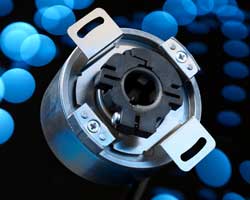
Posted to News on 22nd Jul 2007, 21:36
Incremental encoder mounts on AC induction motors
A new encoder technology, specifically designed to cope with the idiosyncrasies of AC motor mounting, is now available from Sick (UK) Ltd. With a larger bearing spacing, an isolated shaft and a metal encoder disc, Sick believes the new VFS60 will set new benchmarks for encoder performance in a great many industrial applications.

The VFS60 is a high-resolution incremental hollow shaft encoder in a 60mm housing. Excellent concentricity and exceptional robustness are achieved thanks to the large spacing between the ball bearings, which support the encoder shaft and, with electrical isolation between motor shaft and encoder, the VFS60 substantially improves interference immunity and reliability when mounting on AC motors.
During the past 20 years, Sick|Stegmann has developed experience and know-how through its close working relationship with some of the world's leading manufacturers of servo motors. The new VFS60 incremental AC motor feedback encoder is a product of that experience.
Design specifics
Most incremental encoders used on AC induction motors today were originally designed as standalone units for use on machinery, with small mechanical modifications to enable mounting on AC induction motors. Often issues such as run-out, bearing currents and extremes of temperature found in motor applications were not considered.
All incremental encoders have two shaft bearings and, in most encoder designs, these are positioned very close together. This makes it very difficult to produce an encoder without run-out. While this type of construction is suitable for standalone encoders, motor feedback encoders require an altogether different construction, as any run-out will be seen as ripple on the speed feedback. For this reason the bearings in the VFS60 have a large separation to ensure that run-out is kept to a minimum.
Another feature of most incremental encoder designs is the fact that the bearings of the encoder are not isolated. As a result, it is possible for stray currents in the shaft of the motor to pass through the bearings of the encoder and down the encoder ground connection. Over a period of time, this causes the encoder bearings to become rough and pitted, leading to eventual encoder failure as the bearings loose their integrity and the disc inside the encoder starts to make contact with the pick-up electronics.
When used as a standalone encoder on a machine, this is rarely a problem, as the drive shaft does not have stray currents flowing through it. However, when used as a feedback system for an AC induction motor, this weakness often becomes apparent. The VFS60 has an isolated shaft to prevent bearing currents and guarantee reliable long life operation.
Metal encoder disc
The final feature that is claimed to set the VFS60 apart from its peers is its metal encoder disc. In conventional encoder designs, either a glass or plastic disc is used. The traditional glass disc enables the creation of highly accurate signals and is stable at extremes of temperature. However, glass is fragile and therefore limits the application areas of the motor and encoder unit.
In an attempt to overcome this weakness, some encoder manufacturers have turned to plastic. Encoders using plastic discs have the benefit of being more robust than their glass disc rivals but cannot achieve the same levels of accuracy. In addition, they have a restricted temperature range, as the plastic tends to deform at higher temperatures.
Using a new pick-up system incorporating a metal code disc, the VFS60 produces a signal quality as good as a glass disc encoder but with the robustness of an encoder with a plastic disc. In addition, the VFS60 has an operating temperature range of -20 to 100degC.
The new VFS60 incremental motor feedback encoder for AC induction motors offers users all the features needed for key applications including multiple through-hollow-shaft mounting options (10, 12, 14, 15mm and 3/8inch and 1/2inch). From within its IP65-rated enclosure it offers a high level of dynamic performance, with up to 10,000 lines (40,000ppr after x4 multiplication); minimal run-out; electrical isolation of the shaft; a high operating-temperature range; and a robust construction. The Sick|Stegmann VFS60 also meets the requirements of RoHS and is CE and UL approved.
Want the latest machine building news straight to your inbox? Become a MachineBuilding member for free today >>

















